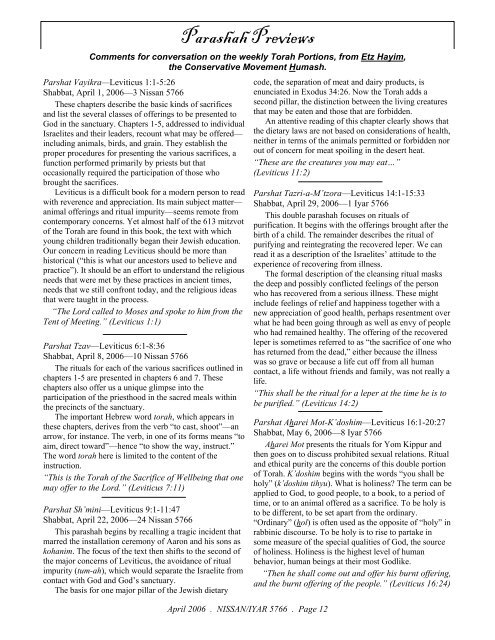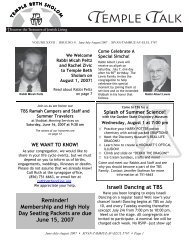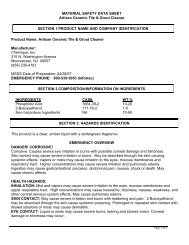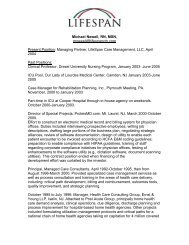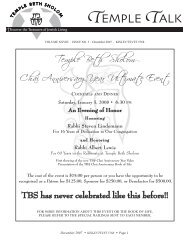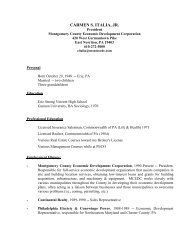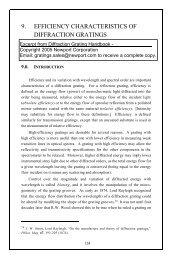Create successful ePaper yourself
Turn your PDF publications into a flip-book with our unique Google optimized e-Paper software.
Parashah Previews<br />
Comments for conversation on the weekly Torah Portions, from Etz Hayim,<br />
the Conservative Movement Humash.<br />
Parshat Vayikra—Leviticus 1:1-5:26<br />
Shabbat, April 1, 2006—3 Nissan 5766<br />
These chapters describe the basic kinds of sacrifices<br />
and list the several classes of offerings to be presented to<br />
God in the sanctuary. Chapters 1-5, addressed to individual<br />
Israelites and their leaders, recount what may be offered—<br />
including animals, birds, and grain. They establish the<br />
proper procedures for presenting the various sacrifices, a<br />
function performed primarily by priests but that<br />
occasionally required the participation of those who<br />
brought the sacrifices.<br />
Leviticus is a difficult book for a modern person to read<br />
with reverence and appreciation. Its main subject matter—<br />
animal offerings and ritual impurity—seems remote from<br />
contemporary concerns. Yet almost half of the 613 mitzvot<br />
of the Torah are found in this book, the text with which<br />
young children traditionally began their Jewish education.<br />
Our concern in reading Leviticus should be more than<br />
historical (“this is what our ancestors used to believe and<br />
practice”). It should be an effort to understand the religious<br />
needs that were met by these practices in ancient times,<br />
needs that we still confront today, and the religious ideas<br />
that were taught in the process.<br />
“The Lord called to Moses and spoke to him from the<br />
Tent of Meeting.” (Leviticus 1:1)<br />
Parshat Tzav—Leviticus 6:1-8:36<br />
Shabbat, April 8, 2006—10 Nissan 5766<br />
The rituals for each of the various sacrifices outlined in<br />
chapters 1-5 are presented in chapters 6 and 7. These<br />
chapters also offer us a unique glimpse into the<br />
participation of the priesthood in the sacred meals within<br />
the precincts of the sanctuary.<br />
The important Hebrew word torah, which appears in<br />
these chapters, derives from the verb “to cast, shoot”—an<br />
arrow, for instance. The verb, in one of its forms means “to<br />
aim, direct toward”—hence “to show the way, instruct.”<br />
The word torah here is limited to the content of the<br />
instruction.<br />
“This is the Torah of the Sacrifice of Wellbeing that one<br />
may offer to the Lord.” (Leviticus 7:11)<br />
Parshat Sh’mini—Leviticus 9:1-11:47<br />
Shabbat, April 22, 2006—24 Nissan 5766<br />
This parashah begins by recalling a tragic incident that<br />
marred the installation ceremony of Aaron and his sons as<br />
kohanim. The focus of the text then shifts to the second of<br />
the major concerns of Leviticus, the avoidance of ritual<br />
impurity (tum-ah), which would separate the Israelite from<br />
contact with God and God’s sanctuary.<br />
The basis for one major pillar of the Jewish dietary<br />
April 2006 . NISSAN/IYAR 5766 . Page 12<br />
code, the separation of meat and dairy products, is<br />
enunciated in Exodus 34:26. Now the Torah adds a<br />
second pillar, the distinction between the living creatures<br />
that may be eaten and those that are forbidden.<br />
An attentive reading of this chapter clearly shows that<br />
the dietary laws are not based on considerations of health,<br />
neither in terms of the animals permitted or forbidden nor<br />
out of concern for meat spoiling in the desert heat.<br />
“These are the creatures you may eat…”<br />
(Leviticus 11:2)<br />
Parshat Tazri-a-M’tzora—Leviticus 14:1-15:33<br />
Shabbat, April 29, 2006—1 Iyar 5766<br />
This double parashah focuses on rituals of<br />
purification. It begins with the offerings brought after the<br />
birth of a child. The remainder describes the ritual of<br />
purifying and reintegrating the recovered leper. We can<br />
read it as a description of the Israelites’ attitude to the<br />
experience of recovering from illness.<br />
The formal description of the cleansing ritual masks<br />
the deep and possibly conflicted feelings of the person<br />
who has recovered from a serious illness. These might<br />
include feelings of relief and happiness together with a<br />
new appreciation of good health, perhaps resentment over<br />
what he had been going through as well as envy of people<br />
who had remained healthy. The offering of the recovered<br />
leper is sometimes referred to as “the sacrifice of one who<br />
has returned from the dead,” either because the illness<br />
was so grave or because a life cut off from all human<br />
contact, a life without friends and family, was not really a<br />
life.<br />
“This shall be the ritual for a leper at the time he is to<br />
be purified.” (Leviticus 14:2)<br />
Parshat Aharei Mot-K’doshim—Leviticus 16:1-20:27<br />
Shabbat, May 6, 2006—8 Iyar 5766<br />
Aharei Mot presents the rituals for Yom Kippur and<br />
then goes on to discuss prohibited sexual relations. Ritual<br />
and ethical purity are the concerns of this double portion<br />
of Torah. K’doshim begins with the words “you shall be<br />
holy” (k’doshim tihyu). What is holiness? The term can be<br />
applied to God, to good people, to a book, to a period of<br />
time, or to an animal offered as a sacrifice. To be holy is<br />
to be different, to be set apart from the ordinary.<br />
“Ordinary” (hol) is often used as the opposite of “holy” in<br />
rabbinic discourse. To be holy is to rise to partake in<br />
some measure of the special qualities of God, the source<br />
of holiness. Holiness is the highest level of human<br />
behavior, human beings at their most Godlike.<br />
“Then he shall come out and offer his burnt offering,<br />
and the burnt offering of the people.” (Leviticus 16:24)


